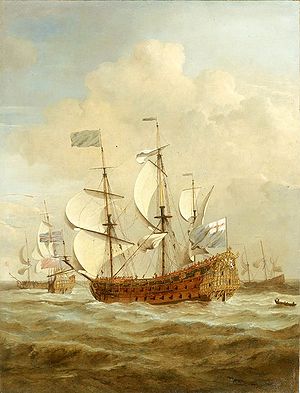HMS St Andrew (1670)
 'HMS St Andrew at Sea in a Moderate Breeze', oil on canvas, by Willem van de Velde the Younger | |
| Career (Great Britain) | |
|---|---|
| Name: | HMS St Andrew |
| Builder: | Christopher Pett, Woolwich Dockyard |
| Launched: | 4 October 1670 |
| Renamed: | HMS Royal Anne |
| Fate: | Broken up, 1727 |
| General characteristics as built[1] | |
| Class and type: | 96-gun First rate ship of the line |
| Tons burthen: | 1298 tons (1319 tonnes) |
| Length: | 129 ft (39 m) (keel) |
| Beam: | 43 ft 6 in (13.26 m) |
| Depth of hold: | 18 ft 8 in (5.69 m) |
| Propulsion: | Sails |
| Sail plan: | Full rigged ship |
| Armament: | 96 guns of various weights of shot |
| General characteristics after 1703 rebuild[2] | |
| Class and type: | 100-gun First rate ship of the line |
| Tons burthen: | 1722 tons (1749.6 tonnes) |
| Length: |
170 ft (52 m) (gundeck) 140 ft 6 in (42.82 m) (keel) |
| Beam: | 48 ft (15 m) |
| Depth of hold: | 19 ft 4 in (5.89 m) |
| Propulsion: | Sails |
| Sail plan: | Full rigged ship |
| Armament: | 100 guns of various weights of shot |
HMS St Andrew was a 96-gun First rate ship of the line of the Royal Navy, built at Woolwich Dockyard by Christopher Pett until his death in March 1668, and then completed by Jonas Shish, and launched in 1670.[1]
In 1703, she was renamed HMS Royal Anne, and rebuilt at Woolwich as a first rate of 100 guns.[2] In 1707, she served as flagship of Vice-Admiral of the Blue Sir George Byng and belonged to Admiral Sir Cloudesley Shovell's fleet. She saw action during the unsuccessful Battle of Toulon and was present during the great naval disaster off the Isles of Scilly when Shovell and four of his ships (Association, Firebrand, Romney and Eagle) were lost, claiming the lives of nearly 2,000[3] sailors. Royal Anne suffered little to no damage and finally managed to reach Portsmouth.
The Royal Anne was broken up in 1727.[2]
Notes
- ↑ 1.0 1.1 Lavery, Ships of the Line vol.1, p161.
- ↑ 2.0 2.1 2.2 Lavery, Ships of the Line vol.1, p165.
- ↑ Sobel, Dava, Longitude: The True Story of a Lone Genius Who Solved the Greatest Scientific Problem of His Time, Fourth Estate Ltd., London 1998, p. 6, ISBN 1-85702-571-7
References
- Lavery, Brian (2003) The Ship of the Line - Volume 1: The development of the battlefleet 1650-1850. Conway Maritime Press. ISBN 0-85177-252-8.
- Winfield, Rif (2009) British Warships in the Age of Sail 1603-1714: Design, Construction, Careers and Fates. Seaforth Publishing. ISBN 978-1-84832-040-6.
| 50px | This article about a ship of the line of the United Kingdom is a stub. You can help Ship Spotting World by expanding it. |
